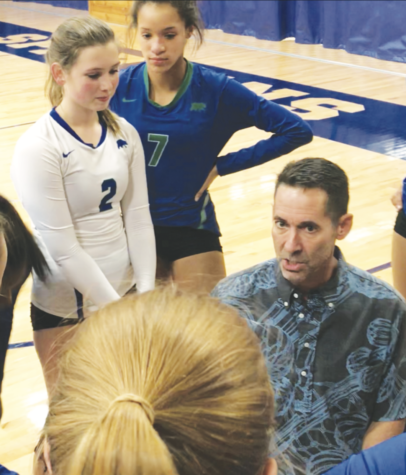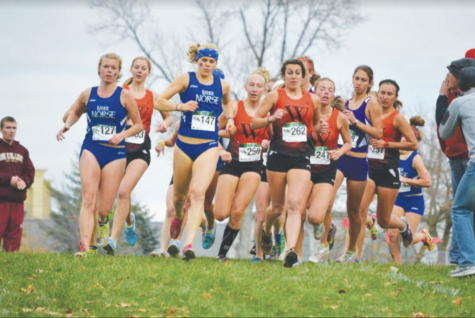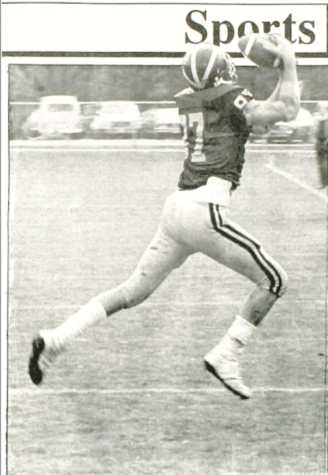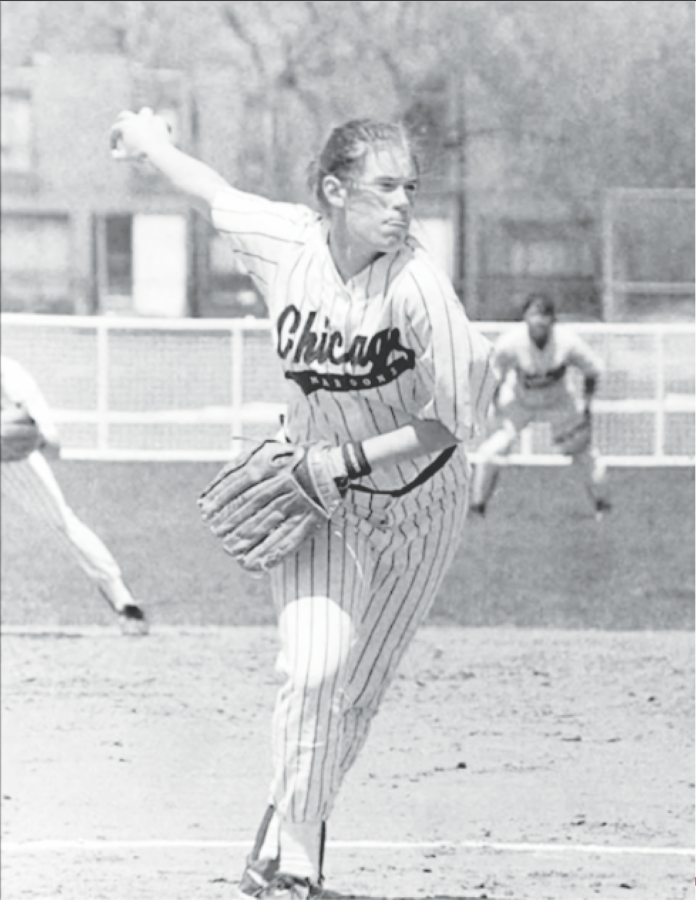From College Athletes to Teachers
Five teachers share, reflect on experiences of college sports
Calderone pitches for her team at the University of Chicago. Calderone was also featured in the University of Chicago Hall of Fame Induction Ceremony 2017-2018.
Did you know that Steve Kaback played volleyball at Berkeley? Or that Beth Calderone was one of the top softball players at the University of Chicago? Or that Mike Bazzett and Lester Batiste played football in college? These are only a few of many Blake teachers who were college athletes while pursuing their respective teaching degrees. While remembering their distinct athletic accomplishments, these teachers reflect on what being a student athlete has taught them from their college experience.
As Bazzett puts it, sports at a college level instills habits, persistence, and discipline and represents a constructive student experience: “The feedback is so immediate in athletics; there’s a scoreboard, the coach is there to help you achieve your goals, they’re not judging you the way I sometimes think students feel like teachers are.”
Bazzett was a receiver and tight end at Carleton College and also ran the 400m hurdles for one track season. He notes that the aspects of football he valued the most were the relationships, the humor, and the camaraderie. Bazzett also appreciated playing football at a Division III sports college because it still granted top liberal arts opportunities. “I didn’t want [football] to become my whole life. I wanted to be a student first and Division III allows you to do that,” he says.
Batiste played football at Colby College as a defensive linemen for all four years of his college career. Like Carleton, Colby is also a Division III school for football. Batiste particularly enjoyed the time he spent in training camp before school started his freshman year, where he first got to know the football team. He emphasizes that football helped him learn to move past failure, not just in the sport, but also in school. “I definitely think the win/loss column of sports is really helpful in terms of academics, especially learning to bounce back from either terrible defeat or potentially something that you didn’t necessarily plan for. Sports definitely gave me the flexibility to pivot in different situations,” he asserts. He even adds that “students solely focused on one area, regardless if it’s academics or sports, lack flexibility.”
Batiste also expresses that the management of being a student athlete in college is a leap from being a student athlete in high school, saying, “In college you don’t necessarily have the leeway that high school has. I definitely had to manage my time, manage my life a lot more strictly than I did in high school.” Despite any challenges of balancing academics and athletics in college, Batiste cherished the entire experience, concluding, “I would definitely do it all over again.”
Kaback was an outside hitter for Berkeley’s men’s volleyball and was the head coach for Blake Girls’ Volleyball from 2017-2019. He grew up in Southern California and began to play men’s volleyball in high school as it was starting to become a high school sport. He says, “I would say volleyball in Southern California is kind of like hockey in Minnesota.”
One part of playing volleyball that Kaback appreciated in college was the unique interdependence in volleyball: “Anytime you’re required to coordinate with other people, to compete, you build trust and reliance on others. I don’t quite get that in other experiences.” He adds that “it was like a blessing to be a college athlete because it gave me a lot of structure to how I organize my time.” Although being an athlete supplemented time-management skills used in academics, he notes that the two areas of his college experiences did not intersect: “I like how as an athlete you have this very nonacademic thing that you have to do, and that kind of clears your head for the academic stuff. They really were independent things for me. When I was doing academic stuff, I was academically focused, and when I was doing volleyball, I was totally focused on volleyball.”
The Social Studies Department Chair Beth Calderone was both a pitcher and a hitter at The University of Chicago – a rare endeavor in high level softball. Calderone reflects that “softball is a thinking person’s game. I loved being a pitcher and I loved being a hitter because it’s like a one-on-one duel.” From her time at The University of Chicago, she accumulated 47 career victories, such as 17 shutouts and striking out 535 batters – a third-of-all-time record in Chicago softball history. Similar to Bazzett’s view, she enjoyed playing Division III sports because she was able to share not just the same athletic goals, but also the same academic interests with her teammates. “I kind of formed my identity around being a top student, so I really wanted to be a student athlete and not just an athlete in college,” she says.
Senior Grade Dean Maggie Bowman was a prolific cross country and track runner throughout high school and college. In track she ran the 1500m and occasionally the 800m. “I loved competing and I just didn’t want to be done with that yet [after high school]. A combination of loving to run and wanting to be part of a team and be competitive was what drove me to continue to participate in college,” she says. She also cherished her experience as a NCAA Division III athlete at Luther College: “I was lucky enough to be on a team that was really competitive. We got to have that championship team athlete experience and I wouldn’t trade that.” “I am a fiercely competitive person, sometimes to a fault,” she adds. Like Kaback, Bowman also recognizes that time-management from being an athlete supplemented her academically, even saying that “I was usually a better student in season than I was out of season. When I had a really rigid practice and competition schedule I was much better at staying on top of everything.”







